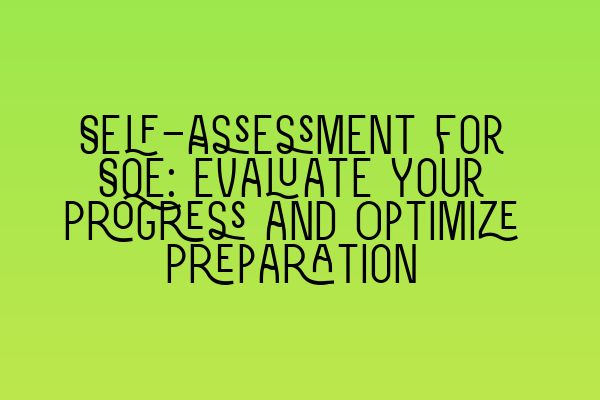Self-Assessment for SQE: Evaluate Your Progress and Optimize Preparation
Preparing for the Solicitors Qualifying Examination (SQE) is a significant endeavor that requires diligent effort and careful planning. As aspiring solicitors, it is crucial to regularly assess your progress and make adjustments to optimize your preparation. In this article, we will discuss the importance of self-assessment for SQE and provide practical tips to help you evaluate your progress effectively.
The Importance of Self-Assessment
Self-assessment plays a vital role in the SQE preparation process. It allows you to identify your strengths and weaknesses, enabling you to focus your efforts on areas that require improvement. By regularly evaluating your progress, you can ensure that you are on track to success and make necessary adjustments to your study plan.
To facilitate your self-assessment, it is essential to establish clear goals and objectives. Set realistic targets for each stage of your preparation and monitor your progress towards achieving them. This will provide you with a sense of direction, motivation, and a benchmark against which to gauge your performance.
Evaluating Your Progress
1. Review your study materials: Take the time to review the study materials you have covered thus far. This includes textbooks, online resources, and lecture notes. Make notes of the key concepts and topics you have mastered and those that require further attention.
2. Complete practice questions and mock exams: Practice questions and mock exams are invaluable resources for self-assessment. By answering these questions and simulating exam conditions, you can gauge your understanding of the subject matter and identify any knowledge gaps.
3. Seek feedback: Engage with fellow students or mentors who are also preparing for the SQE. Discuss your progress and exchange feedback on practice questions and mock exams. Constructive criticism from others can provide fresh perspectives and help you identify areas for improvement.
Optimizing Your Preparation
1. Focus on key topics: Identify the key topics within each SQE module and prioritize your study accordingly. Utilize resources such as the article on Key Topics in SQE Land Law: A Roadmap to Exam Success to guide you in understanding the areas that carry the most weight in the examination.
2. Use essential tips and resources: Familiarize yourself with essential tips and resources that can enhance your preparation. Visit the article on SQE Prep: Essential Tips and Resources for Success in Property Practice to discover valuable advice to support your study efforts.
3. Understand implications and considerations: Land charges are a crucial aspect of property law. Gain a comprehensive understanding of this topic by exploring the article on Examining Land Charges: Implications and Considerations.
4. Know landlord responsibilities: Property law encompasses various facets, including landlord responsibilities. To ensure you grasp the legal obligations involved, refer to the article on Understanding Landlord Responsibilities in the UK: Legal Obligations Explained.
5. Sharpen your skills with interactive mock tests: To refine your property law skills further, consider utilizing interactive SQE mock tests. Visit the article on Interactive SQE Mock Tests for Property: Sharpen Your Skills for Exam Success to explore available resources.
Conclusion
To excel in the SQE, regular self-assessment is crucial. Evaluate your progress, identify areas for improvement, and make the necessary adjustments to optimize your preparation. Utilize the resources mentioned in this article to guide your self-assessment process effectively. Remember, by investing time and effort in self-assessment, you are paving the way for success in the SQE and your future career as a qualified solicitor.

Leave a Reply